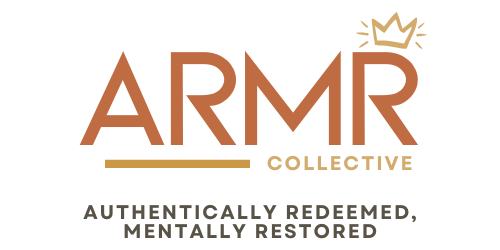I know that God works all things for the good, but why aren’t things good yet?
I remember laying in bed, this thought replaying over and over in my head, my tears creating a damp spot on my pillow. I knew deep down that God was using this pain for something, that somehow I’d come out stronger on the other side, but when would I reach the end of the valley?
It’s hard to see the end when you’re still in the middle.
And the enemy’s favorite tactic is to make us think we have to pick sides between what we’re living through and what Scripture says.
But what if both your pain AND God’s promises are true at the same time?
The Internal War
I wasn’t afraid to admit I was in pain, but every time I did, I felt like I was doubting God. So, then I’d affirm God’s truth that He works all things for the good, but then I felt like I was dismissing my pain and invalidating my own experiences.
I was stuck in a guilt cycle and shame cycle simultaneously. “I shouldn’t feel this way if I really trusted God,” I thought, while also chanting, “If I admit how hard this is, I’m being faithless” in my head.
We see this in real life all the time. We believe God is good, but then our lives fall apart. We know Scripture says God will provide, but then we struggle to pay our bills. We place our identities in “I’m saved and secure”, but then feel spiritually dead sometimes—we wonder if we ever really knew God at all. We know God hears our prayers, but He feels silent when our prayers go seemingly unanswered.
Living in this perceived contradiction is spiritually draining and exhausting. It feels like we’re being ripped in half, unable to fully land on either side. We’re constantly ping-ponging between “being honest” and “having faith”.
This creates the perfect schism for the enemy to sneak into. He uses this exhaustion to make you give up on one or the other. He tries to trap us with “either/or” and make us think “both/and” is impossible.
The Enemy’s Either/Or Trap
We’re already balancing two perceived realities in our minds: I know God is good, but I feel _____. The enemy slips in and wedges himself in the gap, trying to force the two realities as far apart as he can. He whispers, “If THAT’S true, then THIS can’t be.” This creates a false dichotomy where we either have to choose our experience OR God’s truth.
Acknowledging pain then feels like betraying God. And affirming God’s truth then feels like gaslighting ourselves.
Before we know it, we’re stuck in the either/or trap where our own realities and God’s reality can’t possibly exist at the same time. The enemy lies and says “If you really had faith, you wouldn’t feel this way.” We start to believe, “If God’s promises were true, your life wouldn’t look like this.” We flip back and forth between trying to be honest about our trauma and trusting in God. And then we go to church and hear people say they’re “too blessed to be stressed”, and we think if we were truly mature Christians, we wouldn’t wrestle with this tension.
The devil’s native language is lies, so it makes sense why we fall into this trap so easily (John 8:44). The devil can’t create anything for himself, so he twists and corrupts what God has created. Not to mention, a lot of Christians have been taught that negative emotions are unspiritual. Some of us think to be a good Christian we should be happy and grateful all the time. The toxic positivity in churches only reinforces this spiral where we confuse honesty with doubt and vulnerability with weakness.
And then we have the good, old practice of taking Scripture out of context to confirm our own biases. A lot of Christians will use James 1:6-8 out of context: “The one who doubts is like a wave of the sea, blown and tossed by the wind. That person should not expect to receive anything from the Lord. Such a person is double-minded and unstable in all they do.” These verses aren’t saying “don’t have questions or struggles” but mean “don’t ask God what to do and then ignore Him to do your own thing”. It’s about commitment, not certainty. James isn’t telling us to pretend we don’t have struggles, but to ask God WITH faith.
But here’s what the enemy doesn’t want you to know: Scripture is actually FULL of people holding both realities at once.
The Biblical Both/And
Scripture never asks us to choose between reality and truth. In fact, the Bible is filled with people holding both at once. God doesn’t see tension as betrayal—He sees it as an honest relationship. Let’s look at some biblical examples.
When Jesus was about to be crucified, He went to the Garden of Gethsemane to pray. In Luke 22:42, Jesus prays, “Father, if you are willing, take this cup from me; yet not my will but yours be done.” Jesus’ reality was “I don’t want to do this”. But then Jesus submitted and said, “But Your will.” He trusted in God’s plan, despite His own honest desire. Both existed simultaneously. Jesus didn’t pretend the “cup” wasn’t terrible. He acknowledged His human dread regarding the cross AND chose obedience. If Jesus could hold both realities, so can we.
Paul went through something similar. In 2 Corinthians 12:7-10, he writes, “Three times I pleaded with the Lord to take it away.” He wanted relief from the “thorn in the flesh” that was plaguing him. But God’s response was, “My grace is sufficient for you, for my power is made perfect in weakness” (2 Corinthians 12:9). Paul concludes, “Therefore I will boast all the more gladly about my weaknesses.” Paul’s suffering was REAL, AND God’s grace was sufficient. Paul didn’t pretend it wasn’t painful; he learned to hold both truths.
In Psalm 13, David writes, “How long, Lord? Will you forget me forever? How long will you hide your face from me?” His reality was he felt forgotten and abandoned. But the Psalm goes on to say, “But I trust in your unfailing love; my heart rejoices in your salvation.” Despite his own reality of feeling abandoned, David still chooses to trust God’s love.
The psalm doesn’t resolve the tension. Both feelings coexist in the very same prayer. Both the cry and the trust are sacred.
Romans 8:28 says, “God works all things for good for those who love Him.” Some may take this to mean “God makes all things good”—that He resolves all our problems so we can live blissful lives. But this verse says God WORKS THEM together for good. The bad thing is still bad. AND God is working it together with everything else for ultimate good. Both truths coexist.
Living in the Tension
So how does this look in real life?
The Both/And Framework
You can grieve AND trust
1 Thessalonians 4:13 says, “Brothers and sisters, we do not want you to be uninformed about those who sleep in death, so that you do not grieve like the rest of mankind who have no hope.” Notice, in this verse we STILL grieve and acknowledge our pain. But not without hope as we hold God’s truth. We can grieve while having hope.
You can struggle AND be saved
Even Paul struggled with sin as a believer. He writes in Romans 7:15-25, “I do not understand what I do. For what I want to do I do not do, but what I hate I do.” He knows he’s saved; that’s the reality of an identity in Christ. And he’s still struggling; that’s the reality of ongoing sanctification. Again, both can be true at the same time.
You can feel weak AND be strong in Christ
2 Corinthians 12:10 says, “When I am weak, then I am strong.” It doesn’t say “I’m not actually weak at all.” It says “In my weakness, His strength shows up.” Your weakness is REAL. His strength is ALSO real.
You can be overwhelmed AND have peace
If you’re like me, you’ve probably heard Philippians 4:6-7 quoted at you when you’re anxious—maybe even felt guilty for still worrying. “Do not be anxious about anything…And the peace of God which transcends all understanding, will guard your hearts.” The peace of God doesn’t erase the circumstances causing our anxiety. The peace guards us WHILE we’re in the circumstances. We can be in a hard situation (our reality) AND have supernatural peace (God’s reality).
What This Looks Like in Practice
First, we need to stop using “but” between our realities and God’s truth.
“I’m stressed, but God says not to worry.”
We instead need to change our “but’s” into “and’s”.
“I’m stressed, AND God says not to worry. I’ll probably still be stressed, AND I’ll try to rest in God’s peace.”
“This is really hard right now, AND God is still faithful.” This doesn’t negate or invalidate your experiences. The devil is wrong. Both of these truths can be held at the same time; they’re not mutually exclusive.
I felt this when I first launched ARMR Collective. My reality was “I’m terrified and feel completely unqualified to do this.” God’s reality was “I’ve equipped you and called you to this.” For months, I thought I had to wait until I felt qualified. But eventually I realized both could be true. I could be scared AND obedient. I could feel inadequate AND trust His adequacy. The fear didn’t disqualify me; it just proved I needed Him. And looking back, I realize the both/and was always the point—being called doesn’t mean being fearless.
When Toxic Positivity Taught Us Wrong
Many of us learned ONLY to affirm God’s truth. We were taught that acknowledging pain signified a lack of faith. “Just trust God more” became weaponized and invalidated any and all struggles we were facing. So, we learned to just spiritually bypass our own experiences.
The truth is God is big enough for our honesty. The God who created the universe isn’t threatened by our honest feelings. He’s not shocked by our pain or disappointed when we tell Him we’re struggling. Psalm 139:2 says, “You know when I sit and when I rise; you perceive my thoughts from afar.” God already knows how we feel. The only question is whether we’ll be honest with Him about it or not.
The book of Psalms models this radical honesty along with trust. About one-third of the Psalms are laments—raw, honest cries to God. In fact, Jesus Himself quoted Psalm 22:1 while on the cross: “My God, my God, why have you forsaken me?” The common structure of lament psalms follows this pattern: cry out, remember God’s character, continue struggling, yet still trust. Notice what’s missing here. There’s not a neat resolution where everything was fine. They instead end in the middle of pain AND trust. That’s the model God has given us.
Think about Jesus in the Garden of Gethsemane. If anyone could have spiritually bypassed their pain, it was Jesus. Mark 14:33 says He was “deeply distressed and troubled.” He says in Mark 14:34, “My soul is overwhelmed with sorrow to the point of death.” Not “I’m so blessed to die for humanity!” He brought His whole, honest, anguished self to the Father. And God didn’t rebuke Him. He instead sent an angel to strengthen Him. If Jesus modeled honest lament before obedience, why do we always skip straight to “I’m fine”?
We need to turn this mindset on its head. When we only bring God our “good Christian” parts, we’re not bringing our whole selves. We can honor God by bringing Him all of us, messy parts and all.
God doesn’t want a performance or a carefully curated version of ourselves; He wants our presence, all of it.
He wants the doubting parts, the angry, scared, overwhelmed parts. True relationships require vulnerability. When we bring our “best” selves, we’re actually withholding intimacy.
I’ve written before about how toxic Christianity taught many of us to hide our struggles. Spiritual abuse often demands we perform happiness as proof of faith.
But God invites lament, welcomes questions, and can handle our honesty. He prefers it to false positivity that keeps us at arm’s length.
Practical Steps Forward
How do we model this in real life? Let’s start with something simple but powerful: the words we use.
First, we need to stop apologizing for our realities. We don’t need to add disclaimers (“I know I shouldn’t feel this way but…”). Our experiences are valid, not sinful rebellions. And think of it this way: He can see what we’re going through anyway; why not bring it to His feet and ask for help?
We also need to stop downplaying God’s Truth. When we affirm His promises, we’re not gaslighting ourselves. Real truth doesn’t require us to pretend our circumstances don’t exist. His truth stands ALONGSIDE our reality, not instead of it.
Practice the “and” statements. Write down the both/and statements for your specific situations.
“I lost my job AND God will provide.”
“My marriage is struggling AND God is still good.”
“I have anxiety AND I’m not abandoned.”
Speaking God’s truth alongside our struggles doesn’t negate what we’re going through. Both can be true at the same time.
We can also pray honest prayers, bringing God both sides. “God, this hurts so much. I trust You’re working it for good, even though I can’t see it yet.”
The key is this: We’re not choosing one truth over the other. We’re bringing Him both.
Another practice that can help with this tension is journaling. Try this exercise: In the left column, write what you’re experiencing (your reality). In the right column, write what God says (His reality). At the bottom, write how both can be true at once using “and” statements. This visual helps you SEE that the two realities aren’t actually fighting—they’re coexisting.
The Beauty in the Both/And
Authentic faith doesn’t avoid the tension—it embraces it.
Faith isn’t pretending everything is fine. Faith is trusting God IN the mess, not after it’s been cleaned up.
Hebrews 11:1 says, “Faith is confidence in what we hope for and assurance about what we do not see.” We don’t see the resolution yet (reality), but we’re confident it’s coming (faith).
God wants an honest, open relationship with us. He’s not afraid of our pain. He’s not threatened by our doubt. He’s big enough to hold all of us—the hurting parts AND the believing parts.
And I want you to know this: You’re not betraying God by being honest about your pain. You’re not weak for struggling with this tension. You’re human, and that’s exactly what God created you to be.
The enemy wants us to be torn in two. But God wants us whole, which includes BOTH our experiences and His truth. Our reality doesn’t cancel out His promises. And His promises don’t erase our pain. They exist together, and that’s okay.
This week, I encourage you to practice one “and” statement. Bring God your honest reality AND affirm His truth. Stop forcing yourself to choose only one.
The goal isn’t to resolve the tension. The goal here is to trust God IN the tension. I’d argue that’s where faith actually lives.
I’d love to hear from you: What “and” statement do you need to practice this week? What reality have you been afraid to acknowledge alongside God’s truth? Maybe it’s “I’m struggling with my faith AND God hasn’t abandoned me” or “My life feels out of control AND God is still sovereign.”
Share anonymously in the comments below—your story might be exactly what someone else needs to hear.




Waiting is hard AND God’s timing is perfect. Very nicely written on this topic.
Thanks for taking the time to read and comment! Holding both those truths without letting go of either one is such a journey. I’m grateful this connected with you.